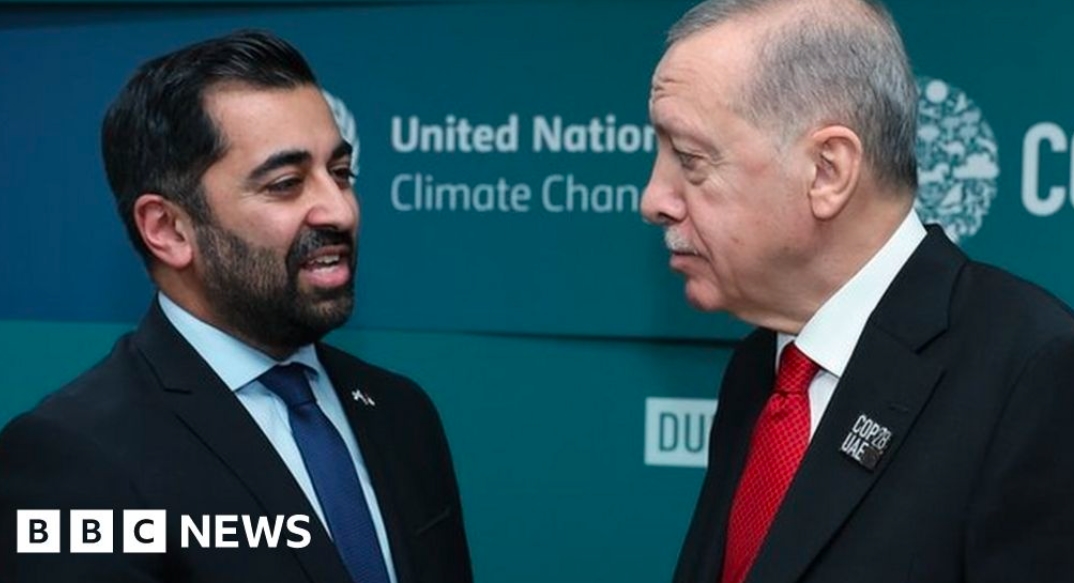Former PM warns Humza Yousaf of ‘serious consequences’ for his visit to Ankara
David Cameron, the former prime minister of the UK, has reportedly warned Humza Yousaf, the First Minister of Scotland, of “serious consequences” for his planned meeting with Recep Tayyip Erdogan, the president of Turkey. Yousaf, who is also the leader of the Scottish National Party (SNP), is scheduled to visit Ankara next week to discuss trade, security, and human rights issues with Erdogan.
According to The National, a pro-independence Scottish newspaper, Cameron sent a letter to Yousaf on Monday, urging him to cancel his trip and accusing him of undermining the UK’s foreign policy and national interests. Cameron claimed that Yousaf’s meeting with Erdogan would send a “dangerous signal” to the international community and damage the UK’s relations with its allies, especially the United States and the European Union.
Cameron also alleged that Yousaf was acting as a “stooge” for Erdogan, who has been widely criticized for his authoritarian rule, crackdown on dissent, and involvement in regional conflicts. Cameron warned Yousaf that he would face “serious consequences” if he proceeded with his visit, implying that the UK government could take legal or political action against him.
Yousaf defends his meeting with Erdogan as ‘in the best interests of Scotland’
Yousaf, however, dismissed Cameron’s letter as a “threat” and a “bullying tactic” and defended his meeting with Erdogan as “in the best interests of Scotland”. He said that he was not afraid of Cameron or the UK government and that he would not be deterred by their “interference” in Scotland’s affairs.

Yousaf said that he was going to Ankara to represent the Scottish people and their values and to promote trade, investment, and cooperation between Scotland and Turkey. He said that he was also going to raise the issues of human rights, democracy, and peace in Turkey and the region, and to express Scotland’s solidarity with the oppressed and persecuted minorities, especially the Kurds.
Yousaf said that he believed that dialogue and diplomacy were the best ways to resolve conflicts and to foster mutual understanding and respect. He said that he was not going to Ankara to endorse or appease Erdogan, but to challenge and engage him. He said that he hoped that his meeting with Erdogan would be constructive and beneficial for both sides.
SNP and Tories clash over Yousaf’s meeting with Erdogan
Yousaf’s meeting with Erdogan has sparked a political controversy in Scotland and the UK, with the SNP and the Tories clashing over the issue. The SNP has accused the Tories of trying to sabotage Scotland’s international relations and of being hypocritical and inconsistent in their stance on Turkey.
The SNP has pointed out that the Tories have repeatedly praised and courted Erdogan in the past, despite his human rights violations and authoritarian policies. The SNP has also reminded the Tories that they were the ones who advocated for Turkey’s membership in the EU and that they have signed a trade deal with Turkey after Brexit.
The Tories, on the other hand, have accused the SNP of being naive and irresponsible in their dealings with Turkey and of endangering the UK’s security and interests. The Tories have argued that Yousaf’s meeting with Erdogan would legitimize and embolden him and that it would alienate and offend the UK’s allies, especially the US and the EU.
The Tories have also questioned the SNP’s motives and agenda for meeting with Erdogan, suggesting that they were seeking to undermine the UK’s unity and sovereignty and to advance their own separatist and nationalist ambitions.
Reaction from Turkey and the international community
The reaction from Turkey and the international community to Yousaf’s meeting with Erdogan has been mixed and cautious. Some Turkish officials and media outlets have welcomed Yousaf’s visit as a sign of friendship and cooperation between Turkey and Scotland and as an opportunity to improve their bilateral ties and to address common challenges and interests.
Some international observers and experts, however, have expressed concern and skepticism about Yousaf’s meeting with Erdogan, warning that it could be risky and counterproductive. They have advised Yousaf to be careful and realistic in his expectations and to be prepared for possible backlash and criticism from Erdogan and his supporters.
They have also urged Yousaf to be firm and principled in his dialogue with Erdogan and to not compromise or concede on the issues of human rights, democracy, and peace. They have also suggested that Yousaf should consult and coordinate with the UK government and other relevant actors before and after his meeting with Erdogan, to avoid any misunderstanding or conflict.


















